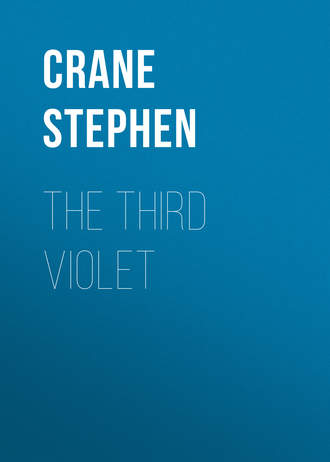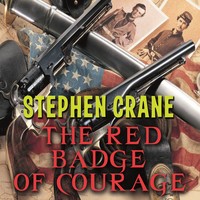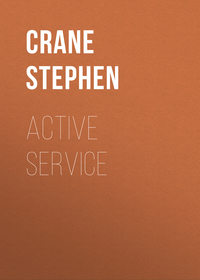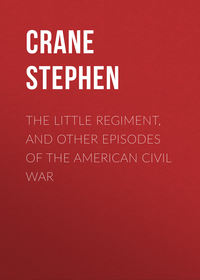 полная версия
полная версияThe Third Violet
"There are innumerable tobacco jars in China," he said, measuring the advantages. "Moreover, there is no perspective. You don't have to walk two miles to see a friend. No. He is always there near you, so that you can't move a chair without hitting your distant friend. You–"
"Did Hollie remain as attentive as ever to the Worcester girls?"
"Yes, of course, as attentive as ever. He dragged me into all manner of tennis games–"
"Why, I thought you loved to play tennis?"
"Oh, well," said Hawker, "I did until you left."
"My sister has gone to the park with the children. I know she will be vexed when she finds that you have called."
Ultimately Hawker said, "Do you remember our ride behind my father's oxen?"
"No," she answered; "I had forgotten it completely. Did we ride behind your father's oxen?"
After a moment he said: "That remark would be prized by the Chinese. We did. And you most graciously professed to enjoy it, which earned my deep gratitude and admiration. For no one knows better than I," he added meekly, "that it is no great comfort or pleasure to ride behind my father's oxen."
She smiled retrospectively. "Do you remember how the people on the porch hurried to the railing?"
CHAPTER XXVII
Near the door the stout proprietress sat intrenched behind the cash-box in a Parisian manner. She looked with practical amiability at her guests, who dined noisily and with great fire, discussing momentous problems furiously, making wide, maniacal gestures through the cigarette smoke. Meanwhile the little handful of waiters ran to and fro wildly. Imperious and importunate cries rang at them from all directions. "Gustave! Adolphe!" Their faces expressed a settled despair. They answered calls, commands, oaths in a semi-distraction, fleeting among the tables as if pursued by some dodging animal. Their breaths came in gasps. If they had been convict labourers they could not have surveyed their positions with countenances of more unspeakable injury. Withal, they carried incredible masses of dishes and threaded their ways with skill. They served people with such speed and violence that it often resembled a personal assault. They struck two blows at a table and left there a knife and fork. Then came the viands in a volley. The clatter of this business was loud and bewilderingly rapid, like the gallop of a thousand horses.
In a remote corner a band of mandolins and guitars played the long, sweeping, mad melody of a Spanish waltz. It seemed to go tingling to the hearts of many of the diners. Their eyes glittered with enthusiasm, with abandon, with deviltry. They swung their heads from side to side in rhythmic movement. High in air curled the smoke from the innumerable cigarettes. The long, black claret bottles were in clusters upon the tables. At an end of the hall two men with maudlin grins sang the waltz uproariously, but always a trifle belated.
An unsteady person, leaning back in his chair to murmur swift compliments to a woman at another table, suddenly sprawled out upon the floor. He scrambled to his feet, and, turning to the escort of the woman, heatedly blamed him for the accident. They exchanged a series of tense, bitter insults, which spatted back and forth between them like pellets. People arose from their chairs and stretched their necks. The musicians stood in a body, their faces turned with expressions of keen excitement toward this quarrel, but their fingers still twinkling over their instruments, sending into the middle of this turmoil the passionate, mad, Spanish music. The proprietor of the place came in agitation and plunged headlong into the argument, where he thereafter appeared as a frantic creature harried to the point of insanity, for they buried him at once in long, vociferous threats, explanations, charges, every form of declamation known to their voices. The music, the noise of the galloping horses, the voices of the brawlers, gave the whole thing the quality of war.
There were two men in the café who seemed to be tranquil. Hollanden carefully stacked one lump of sugar upon another in the middle of his saucer and poured cognac over them. He touched a match to the cognac and the blue and yellow flames eddied in the saucer. "I wonder what those two fools are bellowing at?" he said, turning about irritably.
"Hanged if I know!" muttered Hawker in reply. "This place makes me weary, anyhow. Hear the blooming din!"
"What's the matter?" said Hollanden. "You used to say this was the one natural, the one truly Bohemian, resort in the city. You swore by it."
"Well, I don't like it so much any more."
"Ho!" cried Hollanden, "you're getting correct—that's it exactly. You will become one of these intensely– Look, Billie, the little one is going to punch him!"
"No, he isn't. They never do," said Hawker morosely. "Why did you bring me here to-night, Hollie?"
"I? I bring you? Good heavens, I came as a concession to you! What are you talking about?—Hi! the little one is going to punch him, sure!"
He gave the scene his undivided attention for a moment; then he turned again: "You will become correct. I know you will. I have been watching. You are about to achieve a respectability that will make a stone saint blush for himself. What's the matter with you? You act as if you thought falling in love with a girl was a most extraordinary circumstance.—I wish they would put those people out.—Of course I know that you– There! The little one has swiped at him at last!"
After a time he resumed his oration. "Of course, I know that you are not reformed in the matter of this uproar and this remarkable consumption of bad wine. It is not that. It is a fact that there are indications that some other citizen was fortunate enough to possess your napkin before you; and, moreover, you are sure that you would hate to be caught by your correct friends with any such consommé in front of you as we had to-night. You have got an eye suddenly for all kinds of gilt. You are in the way of becoming a most unbearable person.—Oh, look! the little one and the proprietor are having it now.—You are in the way of becoming a most unbearable person. Presently many of your friends will not be fine enough.—In heaven's name, why don't they throw him out? Are you going to howl and gesticulate there all night?"
"Well," said Hawker, "a man would be a fool if he did like this dinner."
"Certainly. But what an immaterial part in the glory of this joint is the dinner! Who cares about dinner? No one comes here to eat; that's what you always claimed.—Well, there, at last they are throwing him out. I hope he lands on his head.—Really, you know, Billie, it is such a fine thing being in love that one is sure to be detestable to the rest of the world, and that is the reason they created a proverb to the other effect. You want to look out."
"You talk like a blasted old granny!" said Hawker. "Haven't changed at all. This place is all right, only–"
"You are gone," interrupted Hollanden in a sad voice. "It is very plain—you are gone."
CHAPTER XXVIII
The proprietor of the place, having pushed to the street the little man, who may have been the most vehement, came again and resumed the discussion with the remainder of the men of war. Many of these had volunteered, and they were very enduring.
"Yes, you are gone," said Hollanden, with the sobriety of graves in his voice. "You are gone.—Hi!" he cried, "there is Lucian Pontiac.—Hi, Pontiac! Sit down here."
A man with a tangle of hair, and with that about his mouth which showed that he had spent many years in manufacturing a proper modesty with which to bear his greatness, came toward them, smiling.
"Hello, Pontiac!" said Hollanden. "Here's another great painter. Do you know Mr. Hawker?—Mr. William Hawker—Mr. Pontiac."
"Mr. Hawker—delighted," said Pontiac. "Although I have not known you personally, I can assure you that I have long been a great admirer of your abilities."
The proprietor of the place and the men of war had at length agreed to come to an amicable understanding. They drank liquors, while each firmly, but now silently, upheld his dignity.
"Charming place," said Pontiac. "So thoroughly Parisian in spirit. And from time to time, Mr. Hawker, I use one of your models. Must say she has the best arm and wrist in the universe. Stunning figure—stunning!"
"You mean Florinda?" said Hawker.
"Yes, that's the name. Very fine girl. Lunches with me from time to time and chatters so volubly. That's how I learned you posed her occasionally. If the models didn't gossip we would never know what painters were addicted to profanity. Now that old Thorndike—he told me you swore like a drill-sergeant if the model winked a finger at the critical time. Very fine girl, Florinda. And honest, too—honest as the devil. Very curious thing. Of course honesty among the girl models is very common, very common—quite universal thing, you know—but then it always strikes me as being very curious, very curious. I've been much attracted by your girl Florinda."
"My girl?" said Hawker.
"Well, she always speaks of you in a proprietary way, you know. And then she considers that she owes you some kind of obedience and allegiance and devotion. I remember last week I said to her: 'You can go now. Come again Friday.' But she said: 'I don't think I can come on Friday. Billie Hawker is home now, and he may want me then.' Said I: 'The devil take Billie Hawker! He hasn't engaged you for Friday, has he? Well, then, I engage you now.' But she shook her head. No, she couldn't come on Friday. Billie Hawker was home, and he might want her any day. 'Well, then,' said I, 'you have my permission to do as you please, since you are resolved upon it anyway. Go to your Billie Hawker.' Did you need her on Friday?"
"No," said Hawker.
"Well, then, the minx, I shall scold her. Stunning figure—stunning! It was only last week that old Charley Master said to me mournfully: 'There are no more good models. Great Scott! not a one.' 'You're 'way off, my boy,' I said; 'there is one good model,' and then I named your girl. I mean the girl who claims to be yours."
"Poor little beggar!" said Hollanden.
"Who?" said Pontiac.
"Florinda," answered Hollanden. "I suppose–"
Pontiac interrupted. "Oh, of course, it is too bad. Everything is too bad. My dear sir, nothing is so much to be regretted as the universe. But this Florinda is such a sturdy young soul! The world is against her, but, bless your heart, she is equal to the battle. She is strong in the manner of a little child. Why, you don't know her. She–"
"I know her very well."
"Well, perhaps you do, but for my part I think you don't appreciate her formidable character and stunning figure—stunning!"
"Damn it!" said Hawker to his coffee cup, which he had accidentally overturned.
"Well," resumed Pontiac, "she is a stunning model, and I think, Mr. Hawker, you are to be envied."
"Eh?" said Hawker.
"I wish I could inspire my models with such obedience and devotion. Then I would not be obliged to rail at them for being late, and have to badger them for not showing up at all. She has a beautiful figure—beautiful."
CHAPTER XXIX
When Hawker went again to the house of the great window he looked first at the colossal chandelier, and, perceiving that it had not moved, he smiled in a certain friendly and familiar way.
"It must be a fine thing," said the girl dreamily. "I always feel envious of that sort of life."
"What sort of life?"
"Why—I don't know exactly; but there must be a great deal of freedom about it. I went to a studio tea once, and–"
"A studio tea! Merciful heavens– Go on."
"Yes, a studio tea. Don't you like them? To be sure, we didn't know whether the man could paint very well, and I suppose you think it is an imposition for anyone who is not a great painter to give a tea."
"Go on."
"Well, he had the dearest little Japanese servants, and some of the cups came from Algiers, and some from Turkey, and some from– What's the matter?"
"Go on. I'm not interrupting you."
"Well, that's all; excepting that everything was charming in colour, and I thought what a lazy, beautiful life the man must lead, lounging in such a studio, smoking monogrammed cigarettes, and remarking how badly all the other men painted."
"Very fascinating. But–"
"Oh! you are going to ask if he could draw. I'm sure I don't know, but the tea that he gave was charming."
"I was on the verge of telling you something about artist life, but if you have seen a lot of draperies and drunk from a cup of Algiers, you know all about it."
"You, then, were going to make it something very terrible, and tell how young painters struggled, and all that."
"No, not exactly. But listen: I suppose there is an aristocracy who, whether they paint well or paint ill, certainly do give charming teas, as you say, and all other kinds of charming affairs too; but when I hear people talk as if that was the whole life, it makes my hair rise, you know, because I am sure that as they get to know me better and better they will see how I fall short of that kind of an existence, and I shall probably take a great tumble in their estimation. They might even conclude that I can not paint, which would be very unfair, because I can paint, you know."
"Well, proceed to arrange my point of view, so that you sha'n't tumble in my estimation when I discover that you don't lounge in a studio, smoke monogrammed cigarettes, and remark how badly the other men paint."
"That's it. That's precisely what I wish to do."
"Begin."
"Well, in the first place–"
"In the first place—what?"
"Well, I started to study when I was very poor, you understand. Look here! I'm telling you these things because I want you to know, somehow. It isn't that I'm not ashamed of it. Well, I began very poor, and I—as a matter of fact—I—well, I earned myself over half the money for my studying, and the other half I bullied and badgered and beat out of my poor old dad. I worked pretty hard in Paris, and I returned here expecting to become a great painter at once. I didn't, though. In fact, I had my worst moments then. It lasted for some years. Of course, the faith and endurance of my father were by this time worn to a shadow—this time, when I needed him the most. However, things got a little better and a little better, until I found that by working quite hard I could make what was to me a fair income. That's where I am now, too."
"Why are you so ashamed of this story?"
"The poverty."
"Poverty isn't anything to be ashamed of."
"Great heavens! Have you the temerity to get off that old nonsensical remark? Poverty is everything to be ashamed of. Did you ever see a person not ashamed of his poverty? Certainly not. Of course, when a man gets very rich he will brag so loudly of the poverty of his youth that one would never suppose that he was once ashamed of it. But he was."
"Well, anyhow, you shouldn't be ashamed of the story you have just told me."
"Why not? Do you refuse to allow me the great right of being like other men?"
"I think it was—brave, you know."
"Brave? Nonsense! Those things are not brave. Impression to that effect created by the men who have been through the mill for the greater glory of the men who have been through the mill."
"I don't like to hear you talk that way. It sounds wicked, you know."
"Well, it certainly wasn't heroic. I can remember distinctly that there was not one heroic moment."
"No, but it was—it was–"
"It was what?"
"Well, somehow I like it, you know."
CHAPTER XXX
"There's three of them," said Grief in a hoarse whisper.
"Four, I tell you!" said Wrinkles in a low, excited tone.
"Four," breathed Pennoyer with decision.
They held fierce pantomimic argument. From the corridor came sounds of rustling dresses and rapid feminine conversation.
Grief had kept his ear to the panel of the door. His hand was stretched back, warning the others to silence. Presently he turned his head and whispered, "Three."
"Four," whispered Pennoyer and Wrinkles.
"Hollie is there, too," whispered Grief. "Billie is unlocking the door. Now they're going in. Hear them cry out, 'Oh, isn't it lovely!' Jinks!" He began a noiseless dance about the room. "Jinks! Don't I wish I had a big studio and a little reputation! Wouldn't I have my swell friends come to see me, and wouldn't I entertain 'em!" He adopted a descriptive manner, and with his forefinger indicated various spaces of the wall. "Here is a little thing I did in Brittany. Peasant woman in sabots. This brown spot here is the peasant woman, and those two white things are the sabots. Peasant woman in sabots, don't you see? Women in Brittany, of course, all wear sabots, you understand. Convenience of the painters. I see you are looking at that little thing I did in Morocco. Ah, you admire it? Well, not so bad—not so bad. Arab smoking pipe, squatting in doorway. This long streak here is the pipe. Clever, you say? Oh, thanks! You are too kind. Well, all Arabs do that, you know. Sole occupation. Convenience of the painters. Now, this little thing here I did in Venice. Grand Canal, you know. Gondolier leaning on his oar. Convenience of the painters. Oh, yes, American subjects are well enough, but hard to find, you know—hard to find. Morocco, Venice, Brittany, Holland—all oblige with colour, you know—quaint form—all that. We are so hideously modern over here; and, besides, nobody has painted us much. How the devil can I paint America when nobody has done it before me? My dear sir, are you aware that that would be originality? Good heavens! we are not æsthetic, you understand. Oh, yes, some good mind comes along and understands a thing and does it, and after that it is æsthetic. Yes, of course, but then—well– Now, here is a little Holland thing of mine; it–"
The others had evidently not been heeding him. "Shut up!" said Wrinkles suddenly. "Listen!" Grief paused his harangue and they sat in silence, their lips apart, their eyes from time to time exchanging eloquent messages. A dulled melodious babble came from Hawker's studio.
At length Pennoyer murmured wistfully, "I would like to see her."
Wrinkles started noiselessly to his feet. "Well, I tell you she's a peach. I was going up the steps, you know, with a loaf of bread under my arm, when I chanced to look up the street and saw Billie and Hollanden coming with four of them."
"Three," said Grief.
"Four; and I tell you I scattered. One of the two with Billie was a peach—a peach."
"O, Lord!" groaned the others enviously. "Billie's in luck."
"How do you know?" said Wrinkles. "Billie is a blamed good fellow, but that doesn't say she will care for him—more likely that she won't."
They sat again in silence, grinning, and listening to the murmur of voices.
There came the sound of a step in the hallway. It ceased at a point opposite the door of Hawker's studio. Presently it was heard again. Florinda entered the den. "Hello!" she cried, "who is over in Billie's place? I was just going to knock–"
They motioned at her violently. "Sh!" they whispered. Their countenances were very impressive.
"What's the matter with you fellows?" asked Florinda in her ordinary tone; whereupon they made gestures of still greater wildness. "S-s-sh!"
Florinda lowered her voice properly. "Who is over there?"
"Some swells," they whispered.
Florinda bent her head. Presently she gave a little start. "Who is over there?" Her voice became a tone of deep awe. "She?"
Wrinkles and Grief exchanged a swift glance. Pennoyer said gruffly, "Who do you mean?"
"Why," said Florinda, "you know. She. The—the girl that Billie likes."
Pennoyer hesitated for a moment and then said wrathfully: "Of course she is! Who do you suppose?"
"Oh!" said Florinda. She took a seat upon the divan, which was privately a coal-box, and unbuttoned her jacket at the throat. "Is she—is she—very handsome, Wrink?"
Wrinkles replied stoutly, "No."
Grief said: "Let's make a sneak down the hall to the little unoccupied room at the front of the building and look from the window there. When they go out we can pipe 'em off."
"Come on!" they exclaimed, accepting this plan with glee.
Wrinkles opened the door and seemed about to glide away, when he suddenly turned and shook his head. "It's dead wrong," he said, ashamed.
"Oh, go on!" eagerly whispered the others. Presently they stole pattering down the corridor, grinning, exclaiming, and cautioning each other.
At the window Pennoyer said: "Now, for heaven's sake, don't let them see you!—Be careful, Grief, you'll tumble.—Don't lean on me that way, Wrink; think I'm a barn door? Here they come. Keep back. Don't let them see you."
"O-o-oh!" said Grief. "Talk about a peach! Well, I should say so."
Florinda's fingers tore at Wrinkle's coat sleeve. "Wrink, Wrink, is that her? Is that her? On the left of Billie? Is that her, Wrink?"
"What? Yes. Stop punching me! Yes, I tell you! That's her. Are you deaf?"
CHAPTER XXXI
In the evening Pennoyer conducted Florinda to the flat of many fire-escapes. After a period of silent tramping through the great golden avenue and the street that was being repaired, she said, "Penny, you are very good to me."
"Why?" said Pennoyer.
"Oh, because you are. You—you are very good to me, Penny."
"Well, I guess I'm not killing myself."
"There isn't many fellows like you."
"No?"
"No. There isn't many fellows like you, Penny. I tell you 'most everything, and you just listen, and don't argue with me and tell me I'm a fool, because you know that it—because you know that it can't be helped, anyhow."
"Oh, nonsense, you kid! Almost anybody would be glad to–"
"Penny, do you think she is very beautiful?" Florinda's voice had a singular quality of awe in it.
"Well," replied Pennoyer, "I don't know."
"Yes, you do, Penny. Go ahead and tell me."
"Well–"
"Go ahead."
"Well, she is rather handsome, you know."
"Yes," said Florinda, dejectedly, "I suppose she is." After a time she cleared her throat and remarked indifferently, "I suppose Billie cares a lot for her?"
"Oh, I imagine that he does—in a way."
"Why, of course he does," insisted Florinda. "What do you mean by 'in a way'? You know very well that Billie thinks his eyes of her."
"No, I don't."
"Yes, you do. You know you do. You are talking in that way just to brace me up. You know you are."
"No, I'm not."
"Penny," said Florinda thankfully, "what makes you so good to me?"
"Oh, I guess I'm not so astonishingly good to you. Don't be silly."
"But you are good to me, Penny. You don't make fun of me the way—the way the other boys would. You are just as good as you can be.—But you do think she is beautiful, don't you?"
"They wouldn't make fun of you," said Pennoyer.
"But do you think she is beautiful?"
"Look here, Splutter, let up on that, will you? You keep harping on one string all the time. Don't bother me!"
"But, honest now, Penny, you do think she is beautiful?"
"Well, then, confound it—no! no! no!"
"Oh, yes, you do, Penny. Go ahead now. Don't deny it just because you are talking to me. Own up, now, Penny. You do think she is beautiful?"
"Well," said Pennoyer, in a dull roar of irritation, "do you?"
Florinda walked in silence, her eyes upon the yellow flashes which lights sent to the pavement. In the end she said, "Yes."
"Yes, what?" asked Pennoyer sharply.
"Yes, she—yes, she is—beautiful."
"Well, then?" cried Pennoyer, abruptly closing the discussion.
Florinda announced something as a fact. "Billie thinks his eyes of her."
"How do you know he does?"
"Don't scold at me, Penny. You—you–"
"I'm not scolding at you. There! What a goose you are, Splutter! Don't, for heaven's sake, go to whimpering on the street! I didn't say anything to make you feel that way. Come, pull yourself together."
"I'm not whimpering."
"No, of course not; but then you look as if you were on the edge of it. What a little idiot!"
CHAPTER XXXII
When the snow fell upon the clashing life of the city, the exiled stones, beaten by myriad strange feet, were told of the dark, silent forests where the flakes swept through the hemlocks and swished softly against the boulders.








